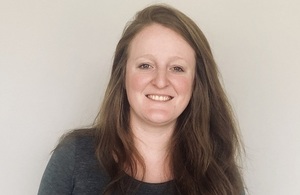DASA Download: Flexibility in innovation funding
The Defence and Security Accelerator's Gabriella Cox chats about changes to the Open Call for Innovation.

Gabriella Cox - Open Call Competition Lead
Gabriella joined the Defence and Security Accelerator (DASA) in December 2018. She has been looking at how DASA operates and will be implementing positive change to achieve operational effectiveness, meeting the needs of our stakeholders.
Innovating in innovation
I firmly believe that if you work in innovation, you need to deliver innovation.
At DASA, we need to be innovative in our own processes, remaining agile to our stakeholders’ needs to ensure that we are harnessing the most innovative ideas. As the ‘go-to’ organisation in Government for innovation across Defence & Security, we also need to be one step ahead if we are to provide our government customers with the very best defence and security solutions.
In my first few months, I have been keen to get out and meet as many of our stakeholders as possible. I have been listening to the views of our government customers, our own regionally based Innovation Partners, our current suppliers and potential innovators, from micros to primes, and understanding from them what works well currently and what we need to improve.
What works well, I am told, is the pace at which we work, our understanding of the market place and our ability to take our innovators on a journey; establishing a path to development, seeking opportunities and introducing our innovators to wider potential customers. What perhaps is not working quite so well, are the inconsistencies in the funding levels and flexibility within the process to adapt proposals between sectors. I am also told that some ideas are not submitted due to the funding levels being too low and the anticipated funding success rate.
The ‘Open’ competition call was set up to encourage anyone with a good idea that has potential to solve defence and/or security challenges to apply for funding, so I hope that the following changes will bring clarity, consistency and new opportunities to stimulate further innovation.
Increasing funding limit
With immediate effect, in the Emerging Innovations category, there will be a new guidance band of between £50,000 and £100,000. In the Rapid Impact category, there will be a new guidance band of between £100,000 - £350,000. The crucial word here is ‘guidance’, we need to work to a limit, but that limit will not stop us from developing a great idea if the cost of funding goes over that number.
Deadlines – de-conflicting with holidays
Finally, we are implementing alternative deadlines for calls – which will no longer be based around the end of the holiday season or school holidays. This will be easier for suppliers to ensure they have the time to get quality proposals in before assessment deadlines and can get hold of our DASA innovation partners should they have any issues. However, it will not necessarily be as easy for our assessors who may similarly not have availability during the holidays. We are keen to make it easier for the innovator, even if it means we have to adapt the way we work internally.
Removing barriers to innovation
The pace of technology change is progressing at an alarming rate so if we don’t move quickly, we can’t keep up with current innovation, so we need to make it as easy as possible for innovators to apply for funding. We don’t want our processes to put potential innovators off from applying through us.
And, I am not alone in my thinking; my colleagues are equally keen to remove barriers to innovation and exploitation as a key DASA objective for 2019.
I believe these changes will remove uncertainty and encourage more, new innovators to approach DASA. To be absolutely clear, if government needs the innovation, we will fund it.
Find out more about the Open Call for Innovation.
About Gabriella
Gabriella leads on the Open Call Competition for DASA. Gabriella is also a trustee for charity Off The Record, leading their digital strategy. Gabriella was previously the Sector Lead for Digital for Enterprise Europe Network, sitting on the EEN worldwide sector group for ICT, the worldwide sub group for Immersive Technology and the Sector Group for Women Entrepreneurship. Gabriella has worked at an array of organisations; from the small, working as project manager at a bespoke software development company in Liverpool; to the large, working at the Department for International Trade as an adviser in Belgium.